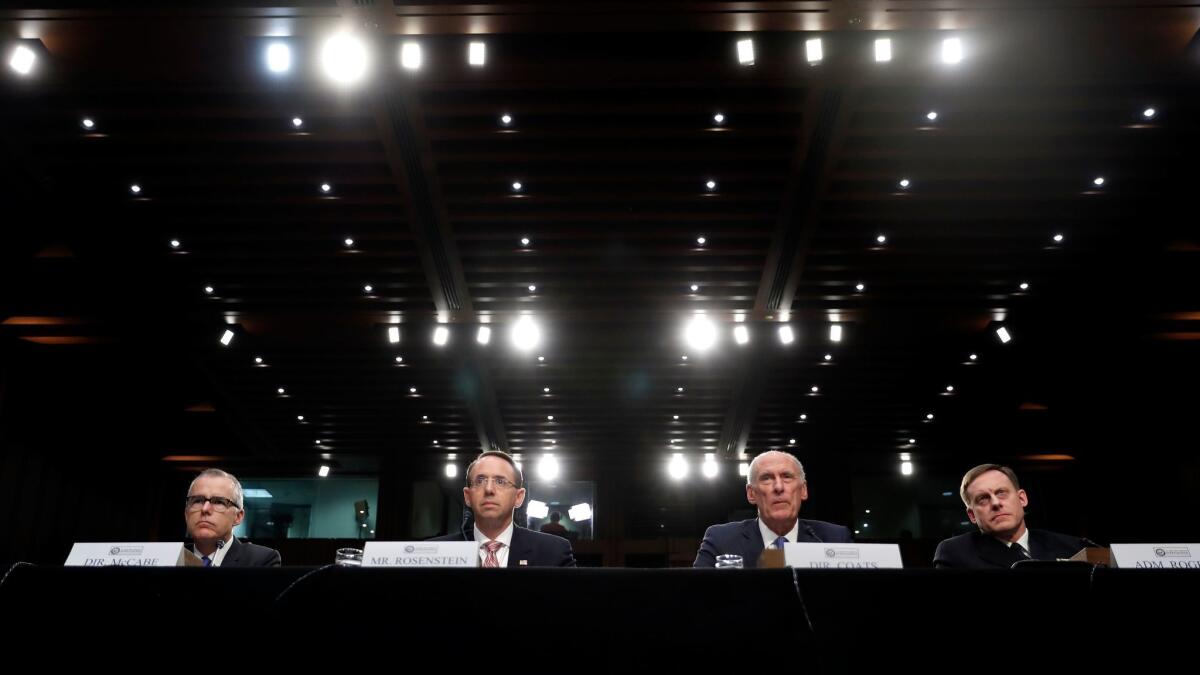Editorial: The U.S. government is still spying on Americans. Here are some fixes for that

The Trump administration is urgently lobbying Congress to reauthorize Section 702 of the Foreign Intelligence Surveillance Act, which allows the National Security Agency to collect the electronic communications of foreigners living abroad. Before he was fired, FBI Director James B. Comey told the Senate Judiciary Committee that losing Section 702 would be “disastrous.”
But Congress should not simply rubber-stamp the law as it exists. Rather, Section 702 should be fine-tuned to afford greater privacy protections for Americans.
For the record:
10:59 p.m. Sept. 21, 2024The recommendation that the FBI be required to obtain judicial approval before searching a database of communications was made by the Privacy and Civil Liberties Oversight Board’s chairman, David Medine.
Yes, Americans. Because even though residents of this country aren’t the targets of Section 702’s elaborate electronic dragnet, their emails, phone calls and Internet chats can be caught up in it incidentally — for example, when a foreign ”target” is emailing or talking on the phone to an American living in the U.S.
Section 702 is the direct descendant of the warrantless electronic surveillance program instituted by the George W. Bush administration after Sept. 11, 2001, that caused a sensation when its existence was exposed by the New York Times in 2005. Unlike that shadowy program, Section 702 was duly enacted by Congress and is overseen fairly rigorously by a federal court, albeit one that meets in secret.
Americans shouldn’t have to face the possibility of prosecution based on information gathered — without a warrant — for foreign intelligence purposes.
Under Section 702, the government does not need to obtain individual warrants authorizing the surveillance of each person who is targeted. Instead, at the request of the attorney general and the director of national intelligence, the Foreign Intelligence Surveillance Court certifies categories of foreigners who may be appropriately targeted. The court also approves procedures for “minimizing” (protecting the privacy) of information about U.S. citizens collected as part of the surveillance.
Comey’s view of the value of Section 702 is widely shared. Sen. Dianne Feinstein says it “has been a valuable part of our counter-terrorism effort.” In a report published in 2014, after Edward Snowden’s revelations, the president’s Privacy and Civil Liberties Oversight Board concluded that intelligence collected under Section 702 “has enabled the discovery of previously unknown terrorist operatives as well as the locations and movements of suspects already known to the government.”
But civil liberties groups argue that the program does not sufficiently protect Americans’ privacy, although they concede that there is no evidence of egregious abuses.
One persuasive complaint about Section 702 is that the intelligence community hasn’t quantified the number of Americans whose conversations have been captured by surveillance under the program, making it difficult to assess whether it is sufficiently circumscribed. Trump’s director of national intelligence, Dan Coats, told the Senate that “it remains infeasible to generate an exact, accurate, meaningful and responsive methodology that can count how often a U.S. person’s communications may be collected.” That strikes us as defeatist. Congress should insist the intelligence community make a good-faith effort to keep track of how many Americans are caught in the Section 702 net.
And while the acquisition of intelligence under the law is supposed to be “consistent with the 4th Amendment,” information about Americans (which, remember, is gathered without an individualized warrant) can be retained and turned over to law enforcement if it shows evidence of criminal activity. The chairman of the Privacy and Civil Liberties Oversight Board has recommended that the FBI be required to obtain approval from the FISA court before searching a database of communications gathered under the program in connection with criminal matters so that the Section 702 database doesn’t become a repository for fishing expeditions.
That recommendation might seem less urgent given statistics from the Office of the Director of National Intelligence showing that the FBI searched the Section 702 database only once in 2016 in connection with criminal matters unrelated to national security. Still, Americans shouldn’t have to face the possibility of prosecution based on information gathered — without a warrant — for foreign intelligence purposes. That contravenes the guarantee of the 4th Amendment that searches must be reasonable and the long-standing practice of requiring warrants based on probable cause.
Another way to protect Americans’ privacy would be for Congress to codify a recent decision by the NSA to no longer collect communications in which the email address of a foreign target appeared in the text of a message between Americans. The NSA stopped collecting such “about” messages because it apparently felt it couldn’t do so without inadvertently violating safeguards of Americans’ privacy.
Finally, unlike the Trump administration and some Republicans in Congress, we believe that this law — even in an improved version — should be authorized for no more than five years, as the current version was in 2012. A program that collects so much personal information about Americans, and that was enacted in response to a terrorist threat that we all hope is temporary, should be subject to periodic review.
Follow the Opinion section on Twitter @latimesopinionand Facebook
More to Read
A cure for the common opinion
Get thought-provoking perspectives with our weekly newsletter.
You may occasionally receive promotional content from the Los Angeles Times.










